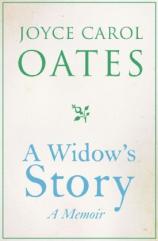A Widow's Story: A Memoir
Review
A Widow's Story: A Memoir
“There are two categories of hospital vigils. The vigil with the happy ending, and the other.” Unfortunately, the title of Joyce Carol Oates’s newest work gives away what kind of vigil she experienced. In 2008, after being admitted to the local hospital in Princeton, New Jersey, with a case of pneumonia, Oates’s husband, Raymond Smith --- editor of The Ontario Review --- died within the week when he contracted a bacterial infection from the hospital environment.
Having gone home one night, fully expecting that she was soon to spring Ray out of the hospital in a matter of days, she is awakened from a deep sleep to be told that her husband has taken a sudden turn for the worse and that she should return to the hospital immediately. She does, only to discover that he passed away before she could get there. And like other writers before her, most notably Joan Didion in A YEAR OF MAGICAL THINKING, her grief, rage and fears all find a home in A WIDOW’S STORY, a visceral and painful look at what happens after a shocking death and how she manages to fight tooth and nail to stay on the path of the living while her best friend and lifetime companion has left her behind.
The saddest thing about Oates’s story is how alone she feels. She worked with Smith on The Ontario Review, the magazine they started together, for their entire marriage, which spanned almost 50 years, and they seemed to have been inseparable. With only pets to care for (the couple had no children), they were each other’s sole reason for living. One wonders --- as one would on any normal day --- how Oates manages to be so prolific. Often in the course of a year, she publishes as many as three books while teaching full-time at Princeton University. With a full slate of appearances, readings, workshops and writer-in-residences to uphold, she obviously has a very busy work life.
However, once she is forced to begin the reckoning of her former life with her new life as a widow, she finds that she is lonely, depressed, angry and seemingly utterly alone. Although the couple has many friends who check in with her and try to bring her comfort --- whether through food, advice or companionship --- Oates is only able to see that her life is now all about one person and not two. This surely is not an unusual response to such a tragic circumstance, but for a woman with such a broad and intriguing life outside her home, it is unexpected to find her feeling so completely by herself.
Oates is a writer who loves language, and the scope of A WIDOW’S STORY is small, sharpening her usual loquaciousness into a blade of sadness that slices at the reader’s heart as she unspools her tales of woe. The last phone messages, the donation of his socks to charity, the buying of new trash cans to fit all the refuse of the sympathy gifts that are sent to her for weeks at a time, are all laid out for us in the most bare-bones and heartfelt way, a strange trail for those of us who read her literary efforts with languor. The book feels like she has opened a vein and just let the blood pour all over the page, revealing to us vulnerabilities and fears that she might be reticent to give even to her own characters.
A WIDOW’S STORY feels so immediate and yet so sure of its sadness and confusion that it literally will take your breath away as you read it. The lack of sentimentality and the reality of life after death will mark it as a memoir unlike any other in this category.
Reviewed by Jana Siciliano on March 28, 2011
A Widow's Story: A Memoir
- Publication Date: March 3, 2011
- Genres: Nonfiction
- Paperback: pages
- Publisher: Non Basic Stock Line
- ISBN-10: 0007388187
- ISBN-13: 9780007388189





